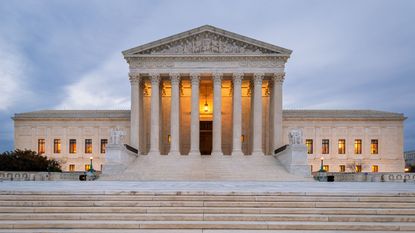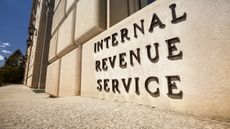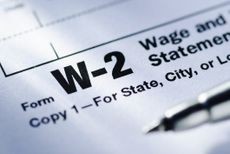Supreme Court to Decide if IRS Can Secretly Obtain Bank Records
Among other high-profile issues, the Supreme Court is considering a case involving taxpayer privacy and the IRS.
- (opens in new tab)
- (opens in new tab)
- (opens in new tab)
- Newsletter sign up Newsletter


The U.S. Supreme Court is in the news lately because of the controversy surrounding federal court rulings on the medication mifepristone (opens in new tab), which is sometimes referred to as an "abortion pill." But you might not have heard that the Supreme Court is also set to decide whether when a taxpayer owes money, the IRS can obtain bank records from that taxpayer’s relatives — without notice — to help with the agency’s tax collection efforts.
The answer to that question likely won’t come until early this summer when the Supreme Court is expected to issue its ruling in Polselli v. IRS (opens in new tab). But the case, which comes as the IRS has been allocated $80 billion in funding over the next 10 years, raises important questions about taxpayer privacy and IRS authority that are good to know.
Supreme Court: Can the IRS Secretly Obtain Your Relatives’ Bank Records?
The dispute in the Polselli case began when a taxpayer (Remo Polselli) owed more than $2 million in taxes to the IRS (opens in new tab).

Sign up for Kiplinger’s Free E-Newsletters
Profit and prosper with the best of expert advice on investing, taxes, retirement, personal finance and more - straight to your e-mail.
Profit and prosper with the best of expert advice - straight to your e-mail.
- Polselli paid some of his tax liability through a limited liability company that he owned, which prompted the IRS to look more closely at Polselli’s financial records.
- The IRS issued a number of administrative summonses to determine whether Polselli was shielding assets.
- Ultimately, the IRS issued summonses to Polselli’s wife’s bank and to two other banks where Polselli’s law firm had accounts.
- But, the IRS didn’t notify Polselli’s wife, Hanna, or the law firm, that they were trying to obtain the banking information.
The IRS can issue a summons to any person under Section 7602 (opens in new tab) of the tax code when the agency sees a need to get information that could aid in the collection of federal tax owed. That information can include books, papers, records, or other data. In some cases, it can also involve testimony under oath.
What's the Problem? In IRS v. Polselli, Polselli’s wife, Hanna, and Polselli’s law firm argue that the IRS should have to notify them if they are going to send a summons for their information to — in this case — their banks. In other words, the IRS shouldn’t be able to "secretly" (i.e., without notice) request bank records of a taxpayer’s relatives or associates who don’t owe the IRS money.
What Is the IRS Arguing? The IRS contends that it has the statutory authority to seek those records without notice to aid in the collection of Remo Polselli’s delinquent taxes. Previous federal cases involving similar issues haven’t resolved the question of whether notice is required when IRS summonses are for information from people’s accounts who don’t owe the IRS taxes. But, there is legal precedent for the IRS summoning records without notice when a taxpayer who owes has a recognizable interest in the requested information.
Why is this Case at the Supreme Court? That all may seem confusing, which is partly why the case made its way to the Supreme Court (opens in new tab). A lower (federal district) court sided with the IRS in the case, finding that Polselli’s wife and the law firm attorneys were not due notice of the IRS summonses. The 6th Circuit Court of Appeals agreed, affirming the district court’s ruling that notice wasn’t required under relevant law.
However, ultimately, the Supreme Court will determine whether the facts of this case warrant what would essentially be an exception to the general rule that notice isn’t required for summonses issued to aid in the collection of tax debt. A key reason is that the IRS “secret” summonses here involve records of individuals who do not have an IRS tax liability.
IRS $80 Billion Spending Plan
The Polselli case comes to the Supreme Court while the IRS is also in the spotlight on Capitol Hill. The Inflation Reduction Act (IRA) allocates $80 billion in funding to the IRS over the next 10 years, and the agency just released a plan describing how it plans to use the funds. However, some Republicans continue to oppose the idea that the IRS needs additional funding and allege that 87,000 new IRS agents will be coming for the tax dollars of hardworking, middle-income Americans.
For its part, the IRS has said that this filing season, taxpayers have already reaped some benefits from initial IRS funding for the agency.
“We have dramatically improved our phone service thanks to more staff. More walk-in services are available across the country. New digital tools have been added. And these are just first steps,” IRS Commissioner Danny Werfel (opens in new tab) said in a statement accompanying the plan’s release.
According to IRS data, some of those filing season 2023 (opens in new tab) improvements include that the agency:
- Answered 2 million more phone calls through live assistance this tax filing season compared to the same period in 2022, and cut call wait times from 27 minutes to four minutes, which Treasury Secretary Janet Yellen describes as an 87% level of service.
- Cleared its pandemic-related backlog of millions of paper returns due to new scanning technology.
- Hired 5,000 new IRS staffers.
Now it’s up to the Supreme Court to make the call on the balance between taxpayer privacy and the IRS’ need to collect outstanding tax debt. (Stay tuned to Kiplinger.)

With more than 20 years of experience as a corporate attorney and business journalist, Kelley R. Taylor has contributed to numerous national print and digital magazines on key issues spanning education, law, health, finance, and tax. Over the years, Kelley has extensively covered major tax developments and changes including the "Trump" tax cuts (TCJA), pandemic-era changes in ARPA, the SECURE 2.0 Act, and the numerous clean energy tax credits in the Inflation Reduction Act. Kelley particularly enjoys translating complex information in ways that help empower people in their daily lives and work.
-
-
 How to Prioritize Paying off Student Loans
How to Prioritize Paying off Student LoansThere are several factors to consider to decide if you should prioritize paying off your student loans.
By Charles Lewis Sizemore, CFA • Published
-
 Stock Market Today: UPS, First Republic Earnings Drag on Stocks
Stock Market Today: UPS, First Republic Earnings Drag on StocksDismal guidance from logistics giant UPS and dreary deposit data from regional lender First Republic kept a lid on the major indexes Tuesday.
By Karee Venema • Published
-
 IRS Says File Soon for $1.5 Billion in Unclaimed Tax Refunds
IRS Says File Soon for $1.5 Billion in Unclaimed Tax RefundsUnclaimed tax refunds from 2019 are waiting for millions of people who might not know it – but only if they file the pandemic-era tax return soon. Are you one of them?
By Kelley R. Taylor • Published
-
 IRS $80 Billion Plan Targets Taxpayer Compliance, Improved Service
IRS $80 Billion Plan Targets Taxpayer Compliance, Improved ServiceThe IRS unveiled its much-anticipated strategic operating plan detailing how the agency will spend $80 billion in funding allocated over 10 years under the Inflation Reduction Act.
By Kelley R. Taylor • Published
-
 Etsy, eBay, PayPal Want IRS 1099-K Relief for Online Sellers
Etsy, eBay, PayPal Want IRS 1099-K Relief for Online SellersCompanies like ebay, Etsy, and PayPal want Congress to raise the new $600 reporting threshold for IRS Form1099-K to give relief to millions of sellers who use their sites.
By Kelley R. Taylor • Published
-
 Tax Scam: IRS Warns Taxpayers Against Filing False W-2 Info
Tax Scam: IRS Warns Taxpayers Against Filing False W-2 InfoScams A new tax scam on social media advises lying on your W-2 to falsely claim credits and bigger refunds.
By Ben Demers • Published
-
 Is Your First RMD Due April 1?
Is Your First RMD Due April 1?An important required minimum distribution (RMD) deadline for some retirees is just around the corner.
By Kelley R. Taylor • Published
-
 How to Find a Tax Preparer: What to Look for in a Tax Professional
How to Find a Tax Preparer: What to Look for in a Tax ProfessionalYou want to find a tax preparer who's qualified, reasonable and knowledgeable to file your taxes. How do you get a tax professional that's right for you?
By Joy Taylor • Published
-
 Tax Day 2023: When is the Last Day to File Your Taxes?
Tax Day 2023: When is the Last Day to File Your Taxes?tax deadline Tax Day for most people is today — April 18. This is when federal income tax returns are due. But some people have some extra time to file. Are you one of them?
By Rocky Mengle • Last updated
-
 Tax Withholding Adjustments Can Boost Your Paycheck Now and Avoid Penalties Later
Tax Withholding Adjustments Can Boost Your Paycheck Now and Avoid Penalties LaterW-4 form If you've had too much or too little tax withheld from your paychecks, there's still time to submit a new Form W-4 to change your tax withholding for the rest of the year.
By Rocky Mengle • Published









